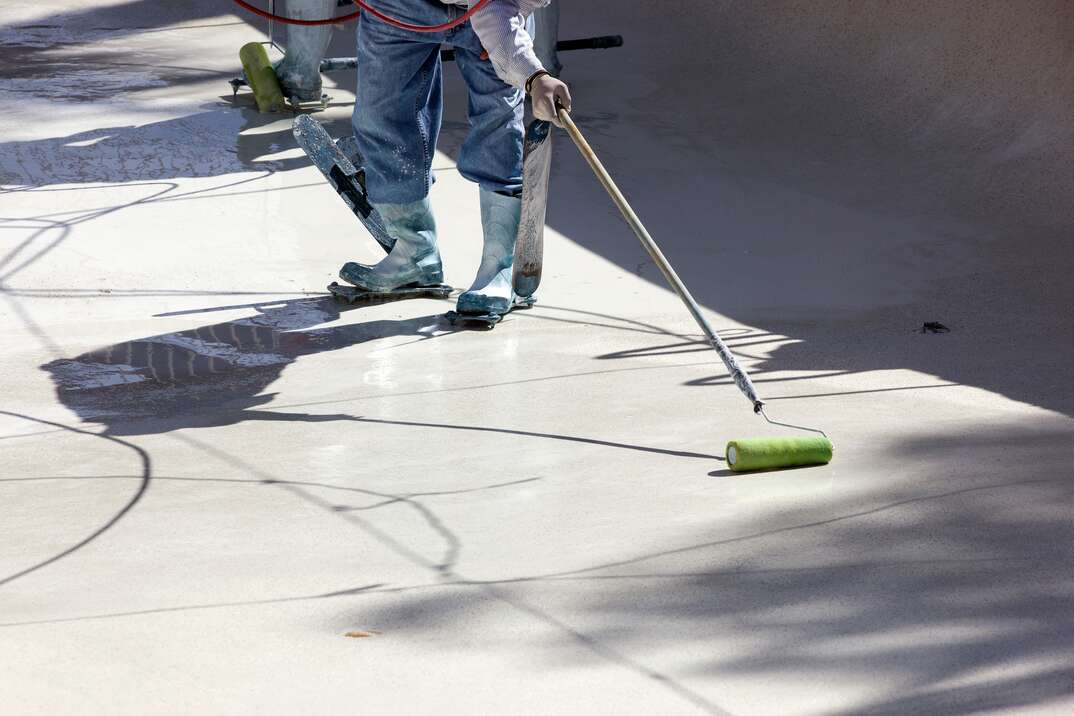- AppliancesElectriciansHVACLandscapingLocksmithPest ControlPlumbingRenovationRoofingT V RepairAll Home Improvement
- Car AccidentClass ActionCorporate LawCriminal DefenseDivorce LawEmployment LawFamily LawFinancial LawLegal AidMedical Injury LawyersMedical MalpracticeReal Estate LawWater Fire RestorationAll Legal
- InvestmentRetirementAll Finance
- Animal InsuranceAutoGeneral InsuranceHealth PolicyHome RentersAll Insurance
- DentalHealth SpecialistsAll Medical
- Animal CareVeterinaryAll Pets
- Auto GlassTowingAll Automotive
What Is Pool Resurfacing?

Is your backyard pool looking a little lackluster? It could be time to resurface the thing.
Read More Home Improvement Articles
Not only does pool replastering renew the look of your swimming hole, but it could also help it last longer. Find out your pool resurfacing options.
Pool resurfacing is the process of removing the existing top layer of the interior sides and bottom of the pool and replacing it with new material. It's a necessary part of owning a pool, just like replacing your roof or siding. The outer coating of your pool gradually deteriorates due to several factors. Weather elements can wear away at the surface, as can the chemicals you use to keep your pool water clean and safe. Regular pool use also leads to wear that can deteriorate the lining.
You can see the deterioration as it progresses. You might notice discoloration in some areas or feel the lining is becoming rough. In addition, you may see cracks, which could allow leaks. Resurfacing early prevents serious deterioration that can damage your pool, so the pool resurfacing cost could save you money on repairs in the long run.
While the pool resurface process can vary based on the pool type, it typically starts with draining the water and removing the existing finish. For concrete pools, that means sandblasting or grinding away the plaster. Refinishing a fiberglass pool usually starts with sanding the surface. At this point, the pool resurfacing contractors check for damage and recommend repairs before applying the new surface material.
What Are the Different Types of Pool Resurfacing?
When you need a pool resurface, you have several options for new materials. They include:
- Thermoplastic polymers
- Epoxy
- Plaster
- Paint
- Fiberglass
- Tile
- Aggregate
- Pebble
Your pool resurfacing options can depend on the current finish. For fiberglass pool resurfacing, the options include thermoplastic polymer coatings and pebble finishes. You can expect to pay between $7,000 and $15,000 (CAD 9,570 and CAD 20,507), according to data from HomeGuide.
For pool concrete resurfacing, the most common pool resurface options are plaster, aggregate and pebble finish. It typically costs between $6,000 and $15,000 (CAD 8,203 and CAD 20,507) to do the job.
While you can't resurface a vinyl pool in the traditional way, you can replace the vinyl liner if your pool needs a refresh. The price typically ranges from $3,000 to $7,500 (CAD 4,101 to CAD 10,253).
More Related Articles:
- How Much Does a Home Inspection Cost?
- 4 Tips for Hiring a General Contractor for Your Next Remodeling Project
- Should You Hire a Contractor or a Handyman?
- 5 Things to Look For When You're Hiring an Electrician
- What to Look for When Hiring an Exterminator
How often you need to do pool replastering depends on your location and pool use. A general guideline for pool resurface timing is once every 10 to 20 years. However, you may need to resurface your pool more often if you live in a harsh climate or the pool gets frequent use. Pools in warmer climates are often used for more months out of the year, which could cause them to wear faster.
Instead of focusing on a set interval, pay attention to the appearance of your pool's surface. Signs that it might be time for pool replastering include:
- Discolored spots
- Bubbling or blistering
- Flaking or peeling
- Cracks
- Roughness or coarseness
- Loss of pebbles
- Leaks or decreasing water levels
Inspect your pool regularly to look for these potential issues. If you're not sure that it's time for a resurfacing, contact pool resurfacing contractors to get their opinion. They can inspect your pool and recommend pool resurfacing options that will work well. You can also get a pool resurfacing cost estimate.
Can You DIY a Pool Resurface?
While you can do the pool replastering work yourself, it's a long, tedious process. Prepping the surface can take an extensive amount of time, especially if you have a large pool. Even professional pool resurfacing contractors who work full-time on the project usually take several days to complete it.
Another concern is making a mistake in the prep or application. One small mistake could lead to major leaks or extensive damage to your pool. Saving money on the pool resurfacing cost by doing it yourself could turn into a costly repair in that situation. If you're considering a DIY pool resurface, assess your skills carefully to make sure you can complete the work successfully.
Elocal Editorial Content is for educational and entertainment purposes only. Editorial Content should not be used as a substitute for advice from a licensed professional in your state reviewing your issue. Systems, equipment, issues and circumstances vary. Follow the manufacturer's safety precautions. The opinions, beliefs and viewpoints expressed by the eLocal Editorial Team and other third-party content providers do not necessarily reflect the opinions, beliefs and viewpoints of eLocal or its affiliate companies. Use of the Blog is subject to the
Website Terms and Conditions.The eLocal Editorial Team operates independently of eLocal USA's marketing and sales decisions.



